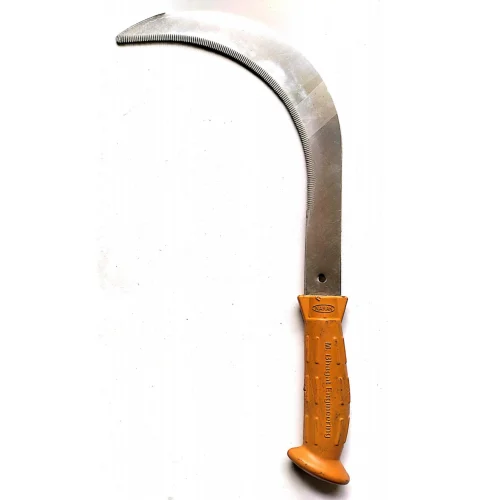2.5mm Carbon Steel Japanese Hand Sickle
₹40.0
| Usage/Application | Agriculture |
| Brand | MBE |
| Model Name/Number | 3 |
| Material | PVC (Handle) |
| Size | 12 Inch ( Length ) |
| Blade Material | Carbon Steel |
| Blade Thickness | 2.5mm |
- Description
- Additional information
- Reviews (0)
- Q & A
- Sustainability Remark
- More Offers
- Store Policies
- Inquiries
We V.V Manufacturer based in Rajkot Gujarat are Leading Manufacturer & Supplier of PVC / Plastic Agriculture Hand Sickel & Wooden Agriculture Hand Sickle and We can Supply All Over in India.
| brands | MBE |
|---|
You must be logged in to post a review.
Q & A
Harvest management tools can contribute significantly to sustainability in farming by improving efficiency, reducing waste, and optimizing resource utilization. Here are some ways in which harvest management tools promote sustainability:
Yield optimization: Harvest management tools help farmers determine the optimal timing for harvesting crops. By analyzing factors such as crop maturity, weather conditions, and market demand, farmers can maximize yield while minimizing post-harvest losses. This reduces waste and ensures efficient resource allocation.
Resource efficiency: These tools assist farmers in allocating resources such as labor, machinery, and storage capacity effectively. By optimizing harvest schedules and logistics, farmers can reduce unnecessary resource consumption, minimize energy usage, and lower overall production costs.
Quality preservation: Harvest management tools facilitate the monitoring and control of environmental conditions during harvesting and post-harvest processes. This includes temperature, humidity, and ventilation control, which are critical for preserving the quality and shelf life of harvested crops. By minimizing spoilage and maintaining product quality, farmers can reduce food waste and improve marketability.
Traceability and food safety: Harvest management tools often incorporate traceability features, enabling farmers to track the origin and journey of harvested crops. This improves food safety by quickly identifying and addressing any issues or contamination risks. Additionally, traceability enhances transparency in the supply chain and supports sustainable practices, such as fair trade and organic certifications.
Data-driven decision-making: Harvest management tools generate valuable data on yield, quality, and resource utilization. By analyzing this data, farmers can gain insights into the performance of different crop varieties, farming practices, and environmental conditions. This information enables evidence-based decision-making, leading to continuous improvement in farming techniques and sustainability outcomes.
Waste management: Harvest management tools help farmers optimize waste management processes, such as composting, recycling, or repurposing agricultural byproducts. These tools can provide guidance on handling and utilizing crop residues, reducing waste sent to landfills and promoting circular economy principles.
To ensure the sustainability of harvest management tools, it is important to consider factors such as their energy consumption, durability, ease of maintenance, and compatibility with existing farming systems. Additionally, incorporating feedback from farmers, researchers, and industry stakeholders in the development and improvement of these tools can enhance their sustainability performance and adoption.
General Inquiries
There are no inquiries yet.



















Reviews
There are no reviews yet.